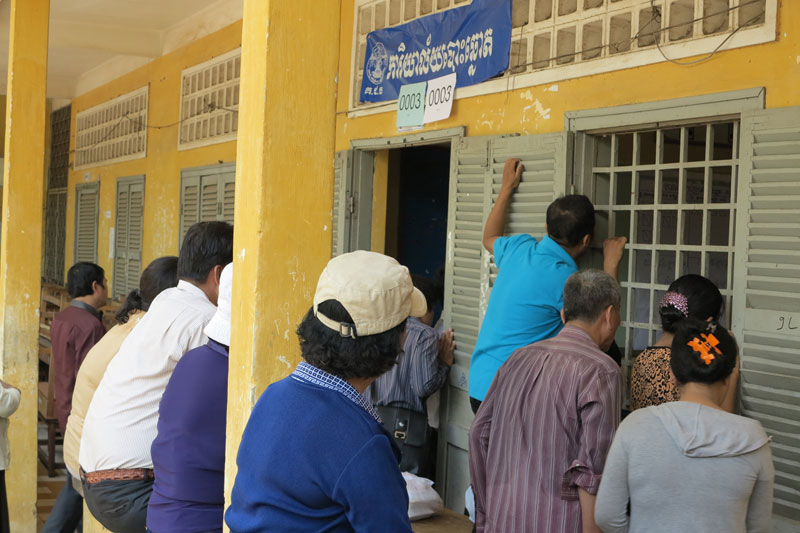The ruling CPP coasted to a series of expected victories in Sunday’s council elections as all but three of the country’s 11,459 commune councilors voted for new administrative councils for the districts, provinces and municipalities they fall under.
Calculations of the provisional results released by the National Election Committee (NEC) last night showed that the CPP secured 8,379 votes (73.12 percent) to the CNRP’s 2,959 (25.82 percent) across the country’s districts.

In the 2009 council elections, the CPP won 8,470 votes to the Sam Rainsy Party’s 2,335 votes across the districts, though the number of commune councilors in the country has risen between elections.
At a press conference in the afternoon, NEC Secretary-General Tep Nytha said the elections had cost a total of $1.7 million. Mao Sophearith, an NEC member, said that voting had taken place without a hitch and only three commune councilors had failed to vote.
“The election situation was smooth and there was not violence,” he said.
Mr. Sophearith told reporters that the NEC is now calculating the number of seats the parties won in each district, provincial and municipal council. However, results for some districts and provinces were posted by Information Minister Khieu Kanharith on his Facebook page beginning Sunday afternoon.
Mr. Kanharith noted that his ruling CPP won 12 seats to the CNRP’s nine on the Kompong Cham provincial council. In Siem Reap province, the CPP won 140 of the available district council positions to the CNRP’s 37 and Funcinpec’s two, according to Mr. Kanharith’s figures.
Ballots for the vote were given only to the country’s commune councilors, who had been elected by popular vote in June 2012. At that election, the CPP won 8,292 council seats, about 72 percent of the total, ensuring the ruling party’s easy victories Sunday.
The two constituent parties of the opposition CNRP, which united as a single party in the month after the commune elections, had by contrast picked up only a cumulative 2,955 councilors (25.79 percent).
Despite the gulf, leaders of the opposition had used the two-week election campaign leading up to the vote to warn the ruling party that its commune councilors were turning against it, and would vote CNRP come election day.
Opposition leader Sam Rainsy had throughout the campaign cited his party’s surprise performance in the disputed 2013 national election as a symbol of changing attitudes he said councilors would replicate with their votes.
At a press conference Sunday afternoon at the CNRP’s headquarters in Phnom Penh’s Meanchey district, Mr. Rainsy claimed some small success.
“At least 30 to 40 people from the CPP voted for our party,” he said.
Mr. Rainsy also claimed that the CNRP picked up two district council chief positions—one in Prey Veng province and another in Kompong Cham province—and said the CNRP accepted the results, despite some foul play.
“We have evidence and proof that the ruling party bought the votes from the candidates of the CNRP, paying up to $5,000 at least,” he said. “They gave them motorbikes and promised to give cars to the CNRP candidates.”
Prior to the 2009 council elections, Mr. Rainsy made a similar accusation, showing a video clip at a press conference of 30 commune councilors claiming to have been offered between $50 and $5,000 to vote for the CPP. After the elections, Mr. Rainsy’s opposition party dismissed 200 of its commune councilors for voting for the CPP in the council elections.
Chheang Vun, a senior CPP lawmaker, on Sunday denied Mr. Rainsy’s accusations.
“I don’t think the CNRP increased their vote by around 30 to 40 from the Cambodian People’s Party, and what Mr. Rainsy said is not true,” Mr. Vun said.
“If the CNRP really increased its vote, it is probably because they got them from members of Funcinpec and the Nationalism Party,” he said.
At voting booths across Phnom Penh in the morning, commune councilors said they were under no illusions about the likely results of the ballot.
One CNRP councilor, Nuoy Chinda, who was elected to the Chey Chumneah commune council in the June 2012 elections—and was voting for the Daun Penh district council and the Phnom Penh municipal council—noted simply that the CPP holds 62 commune councilors in Daun Penh to the CNRP’s 27.
“I think these seats won’t change and will remain stable because the CNRP will vote for the CNRP and the CPP will vote for the CPP,” she said.
The ruling CPP also holds 510 of the 810 commune councilor positions across Phnom Penh, compared to the CNRP’s cumulative 240.
Sak Setha, secretary of state at the Interior Ministry in charge of reform and decentralization, said Sunday that the new councils will have the responsibility of developing five-year development plans and creating and passing budgets with the appointed district and provincial governors.
The district, provincial and municipal councils are mandated by law to meet for the first time within two weeks after an election.
Mr. Setha said the Interior Ministry is beginning to specify additional mandates to the country’s commune, district and provincial councils—such as the management of health centers and sanitation centers.
“From the last five years until now, the districts and communes have had a general mandate—they have the mandate to do anything according to their available resources,” Mr. Setha explained.
“They also have the capacity to develop infrastructure such as roads between the communes within the district. The communes just do small projects like village-to-village roads, and small projects like that,” he said.
The country’s district councils will share a budget of $16 million, which will be doled out according to their geographical size and population, Mr. Setha explained. The councils of the 24 provinces and the municipality of Phnom Penh will share a budget of $50 million, shared similarly, he said.
(Additional reporting by Alex Willemyns)



